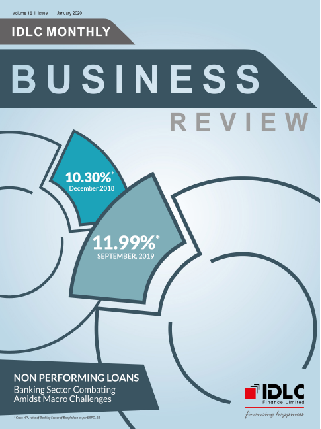
Syed Mahbubur Rahman, Managing Director & CEO Mutual Trust Bank Ltd. Former Chairman, Association of Bankers Bangladesh
MBR: From BDT 99,370 Crore in September,2018 to BDT 1,16, 288 crore in September,2019; the NPL growth in Banking sector seems to be going out of control. Despite of strong policy provided by the regulators, in your opinion what are the major driving forces behind such unwanted growth?
Syed Mahbubur Rahman: If we look at the history of banking sector of Bangladesh, it can be noticed that this sector actually started growing around the early 80s. During that time, in the first generation banks, there used to be insider lending and the presence of corporate governance was very negligible. The system of classifying non-performing loans was extremely lax in absence of a standardized loan classification procedure and specific time limits for loans to be classified. Generally, a long time was required for a loan to be identified as classified, and as such the provisioning requirement was less important. This resulted in huge non-performing loan and the poisonous practice started to spread as the defaulters were not penalized. As we all live in the same society watching people getting away even after defaulting somehow influenced others.
However, by late 80s, Bangladesh Bank started recognizing the threats and gradually corporate governance started to get importance in this sector. The government introduced a comprehensive financial sector reform program in the country in the late 80s. As part of this program, a new system of loan classification and provisioning against potential loan losses for advances was introduced. Restrictions on internal lending established where proper disclosure in annual report with permission from Bangladesh Bank was introduced. On the other hand, as there was no loan courts, defaulters were also taking the advantage of this. The civil courts were burdened with other businesses and such suits of banks consumed time for disposing of. The delay caused made the bank sector suffer for non-realisation of dues in time and the
bankers gathered bitter experience in realizing the same. To remove this difficulty, the government enacted a special piece of legislation named “The Artha Rin Adalat Ain, 1990” which failed to fulfil the expectation and subsequently went through some changes, and ultimately was passed in the parliament as “The Artha Rin Adalat Ain, 2003”by repealing the earlier one.
But the processes have been very time consuming, which makes all these less effective. For example, it takes almost 8 to 9 years to dispose. On the other hand, even if we win a case, encashing the production or disposal of collateral or even getting the right value of collateral takes a lot of time. Thus, such lengthy processes have contributed greatly to the culture of impunity. We are, however, getting some positive result by using Section 138 of Negotiable Instruments Act, 1881, dishonoring of Security Cheques . Offence of dishonor of cheque is considered as a criminal offence.
Also another reason is having so many bank for an economy of our size, and this has resulted unhealthy competition, ultimately leading to occurrence of non performing loans. However the government must have insights regarding approving such a large number of Banks. Since all the banks are operating in the same economy, it is obvious that there will be competition and each and every bank has the thrust for profit. Falling into that trap, banks sometimes over finance against negligible securities or without any business cause, which leads to fund diversion and that ultimately fuels nonperforming loans. Bangladesh Bank has strict restriction on mentioning the purpose of financing and monitoring the fund flow but sometimes for the sake of profitability we do not follow those guidelines which also has positive influence on the NPL growth. On the other hand, sometimes we use rescheduling as a short term way out without looking at the capacity of the concerned, which is also not a good practice as ultimately they default. Moreover, as a banker we always focus on the current NPL stock but hardly working on the forward flow. All these factors are working as a driving force in the NPL growth of Bangladesh.
MBR: In order to avoid the adverse selection in case of assessing the potentiality of the clients, what mistakes we are still doing which is contributing to this growing NPL? As a market expert what are your tips to avoid such mistakes?
Syed Mahbubur Rahman: We, as bankers need to be very diligent. Considering the current market scenario, finding the right kind of human resources is a big deal. With the growth of financial institutions, we are having difficulties in having quality resources too. In this business, we must have a qualified resources to have better understanding of our clients’ businesses. This include knowing not only the client’s business but also the need, character, transaction pattern details etc. Apart from understanding the client’s business pattern, it is also important to understand his working capital or term loan requirement. Most importantly, continuous follow up on receivables, stock reports, product details and completion of other documentation are mandatory.
MBR: Considering current market scenario, what macroeconomic factors are affecting and being affected because of such mounting NPL growth?
Syed Mahbubur Rahman: NPL increases as increased number of borrowers default on their loan, which means money is not coming back to the organization, resulting in no reinvestment and supply decreasing. Currency circulation will fall back, banks will not be able to lend as limited resources will be available and as a whole it will affect all financial institutions and thus the whole economy greatly.
MBR: Compared to our neighboring countries like China and Malaysia, in terms of both technical and strategical advancement, particularly in which cases we are falling behind in order to control NPL?
Syed Mahbubur Rahman: To begin with, government and the people in the financial institutions need to have good intention. As we can see from neighboring countries such as China, after the crisis in late 90s, they took steps and reversed the crisis into positive changes at banks. Until there is right governance and things are taken seriously at the top level, things are difficult to change. It will be hard to reduce NPL if actions are not taken at the root level. Also, unless penalty or actions are taken against the defaulters, there will be no urge for people to change and take loan seriously to repay. To bring a change, we must be aware of all the defaulters. We can still see how defaulters are being celebrated in our society. If this continues, nobody would realize and would continue to default. For instance, we can have the names of the defaulter in the system to let everyone know, limit their social right such as voting rights or seizing passport and other important documents. The main idea is to establish penalty against defaulters. Technology can aid in controlling NPL. With the advancement of technology, it’s easier to reach public and create awareness so that people are aware of the defaulters. We have to invest on technology, as we all know future is nothing without technology.
MBR: What are the way outs both Banking sector and Regulators to control the growing NPL growth and what new initiatives should be introduced as per your opinion?
Syed Mahbubur Rahman: Regulators should be allowed to work with independence with no influence. Bangladesh Bank has been trying best to bring changes such as improving customer experience, enhancing security issue etc. We are grateful for the changes it brought. But we need to do more with the technological changes that are happening globally. In respect of reform of laws, Bangladesh bank has already forwarded our recommendations to Law commission and as are awaiting to have their response. Also, government intention must be aligned with the betterment of the future for the financial institutions. Without proper guidance and governance, changes are rare to be plausible. Finally, defaulters must be name and shame to let them realize that they are wrongdoers. Database must be created to keep track of reasons of defaulting and defaulters. Defaulters cannot go unrecognized. With this principle in head, moving forward, I hope we can fight against the growing NPL growth.

Monthly Business Review - January 2020
Bangladesh, the once “bottomless basket” has grown to be the new “Asian Tiger”, on account of incessant growth in the last decade. International investors are eyeing for Bangladesh as a promising investment destination due to immense growth opportunities. Also, the ongoing mega projects will change the blueprint of the country’s infrastructure, which is considered to be an obstacle in doing business.
However, the ever-piling up non-performing loans in the banking sector can make the situation worse.
Non-performing loans eats up the portion of loanable fund of a Financial Institutions by keeping provision, which was otherwise supposed to be channeled to the deficit sector i.e. the business entities or to productive sectors. As of November 2019, government already borrowed 90% of its annual limit from the banks, which will in turn, reduce banks’ portion of loanable fund. Further NPL pressure may aggravate the situation and lead to a liquidity crisis. Alongside, rising non-performing loans will have a direct hit on banks’ solvency scenario, for which banks may succumb to an unhealthy position in long run.
As NPL is constantly becoming a burning issue for the banking sector as well the economy, NPL management is need of this hour. Reinforcing good corporate governance is a prime activity for the sector. Instances of how companies become bankrupt in absence of good governance are aplenty worldwide. In India, merger between the strong banks and the weak banks (in terms of balance sheets) is evident recently as the problem of non-performing bank loans has emerged over the past few years. Our banking industry can also follow their suit, as combining portfolios can provide additional risk diversification. Lastly, establishing Asset Management Companies (AMC) which will purchase the toxic assets of the banks at a discount, and collect from the non-performing assets via selling securities over the years. Without taking care of ever-stacking NPL, the banking sector cannot contribute to the real economic growth. Hence, it is high time the top management of the FIs should come up with effective solutions.
Download View